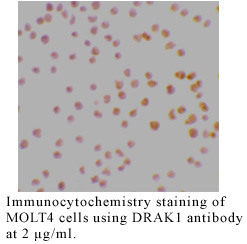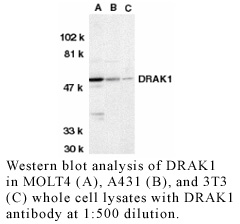Anti-Human DRAK1 (NT)
Data
- -
- -
Antibody DetailsProduct DetailsReactive Species Human Host Species Rabbit Immunogen PN:D281 Product Concentration 0.5 mg/ml Formulation This polyclonal antibody is formulated in phosphate buffered saline (PBS) pH 7.4 containing 0.02% sodium azide as a preservative. Storage and Handling This polyclonal antibody is stable for at least one week when stored at 2-8°C. For long term storage, aliquot in working volumes without diluting and store at –20°C in a manual defrost freezer. Avoid Repeated Freeze Thaw Cycles. Country of Origin USA Shipping Next Day Ambient RRIDAB_2829911 Each investigator should determine their own optimal working dilution for specific applications. See directions on lot specific datasheets, as information may periodically change. DescriptionDescriptionSpecificity Rabbit Anti-Human DRAK1 recognizes an epitope near the N-terminus of Human DRAK1. This polyclonal antibody was purified using affinity chromatography. Background Apoptosis is mediated by death domain containing adapter molecules and a caspase family of proteases. Certain serine/threonine protein kinases, such as ASK-1 and RIP, are mediators of apoptosis. Two novel serine/threonine kinases that induce apoptosis were recently identified and designated DRAK1 and DRAK2 for DAP kinase-related apoptosis-inducing protein kinases.1 DRAKs contain an N-terminal kinase domain and a C-terminal regulation domain. Overexpression of DRAK1 induces apoptosis. DRAKs have high sequence homology to DAP and ZIP kinases, and they represent a novel family of serine/threonine kinases, which mediates apoptosis through their catalytic activities. DRAK1 is located in nucleus and the messenger RNA was ubiquitously expressed in human tissues.1 References & Citations1. Sanjo, H. et al. (1998) J Biol Chem 273:29066-71. Technical ProtocolsCertificate of Analysis |




